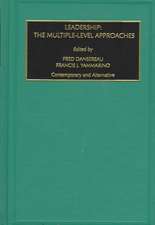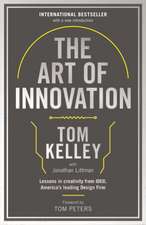Research in Organizational Behavior: Research in Organizational Behavior, cartea 21
Editat de R.I. Sutton, B.M. Stawen Limba Engleză Hardback – 14 apr 1999
| Toate formatele și edițiile | Preț | Express |
|---|---|---|
| Hardback (2) | 586.22 lei 6-8 săpt. | |
| ELSEVIER SCIENCE – 14 oct 2000 | 586.22 lei 6-8 săpt. | |
| ELSEVIER SCIENCE – 14 apr 1999 | 644.85 lei 6-8 săpt. |
Preț: 644.85 lei
Preț vechi: 837.46 lei
-23% Nou
Puncte Express: 967
Preț estimativ în valută:
123.41€ • 128.36$ • 101.88£
123.41€ • 128.36$ • 101.88£
Carte tipărită la comandă
Livrare economică 14-28 aprilie
Preluare comenzi: 021 569.72.76
Specificații
ISBN-13: 9780762305735
ISBN-10: 0762305738
Pagini: 344
Dimensiuni: 156 x 234 x 21 mm
Greutate: 0.66 kg
Ediția:New.
Editura: ELSEVIER SCIENCE
Seria Research in Organizational Behavior
ISBN-10: 0762305738
Pagini: 344
Dimensiuni: 156 x 234 x 21 mm
Greutate: 0.66 kg
Ediția:New.
Editura: ELSEVIER SCIENCE
Seria Research in Organizational Behavior
Cuprins
List of contributors. Preface. A multi-level theory of self-serving behavior in and by organizations (G. Johns). Sources of environmentally destructive behavior: individual, organizational, and institutional perspectives (M.H. Bazerman, A.J. Hoffman). Organizing for high reliability: processes of collective mindfulness (K.E. Weick et al.). Do digital telecommunications affect work and organization? The state of our knowledge (S. O'Mahony, S.R. Barley). An expanded model of organizational identification (K.D. Elsbach). Why people cooperate with organizations: an identity-based perspective (T.R. Tyler). Identity maintenance and adaptation: a multi-level analysis of response to loss (S.F. Freeman). Variance explained: why size does not (always) matter (M. Fichman).































